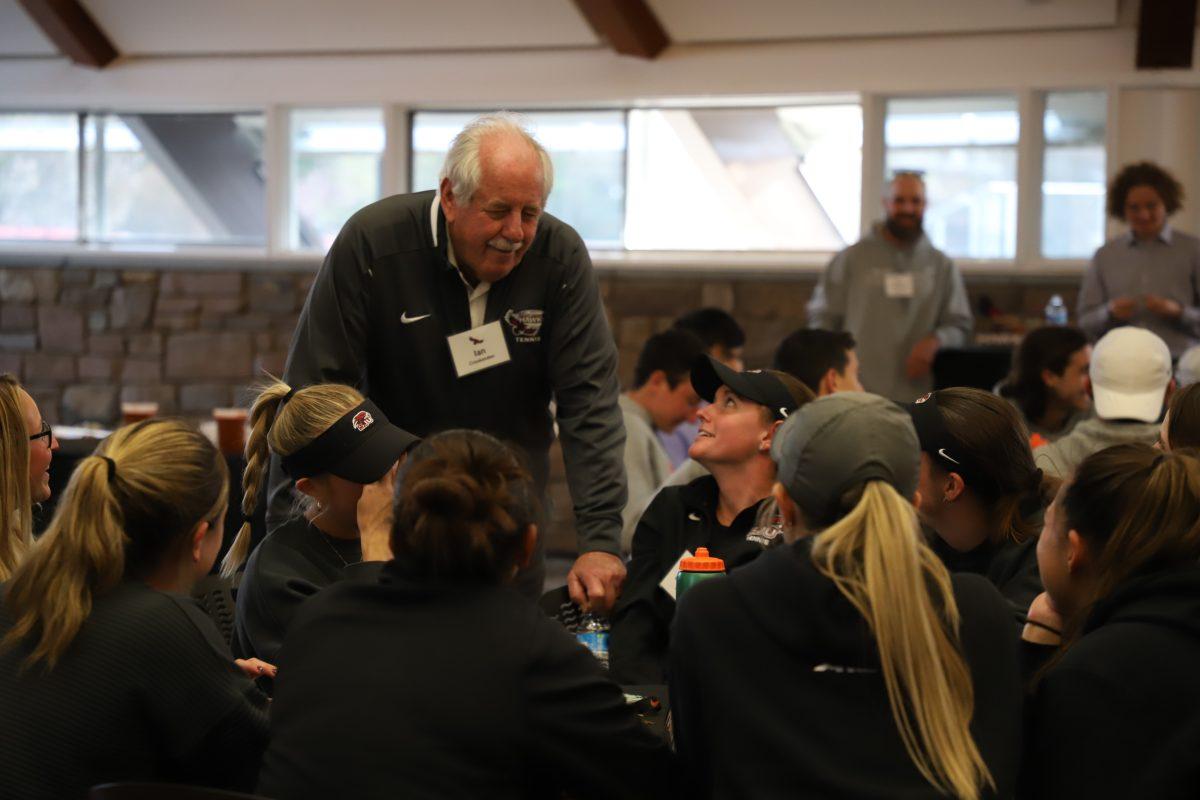Ian Crookenden, the longtime head coach of the St. Joe’s women’s tennis team announced that he would retire following the 2022-23 season.
Crookenden arrived on Hawk Hill in August 2008 as the coach of both the men’s and women’s tennis teams. Before taking the job at St. Joe’s, Crookenden coached for Wake Forest University from 1984 to 1996 and was the director of tennis at the Philadelphia Cricket Club from 1997 until 2008.
Crookenden will remain involved with the St. Joe’s tennis programs in some capacity after his retirement.
The New Zealand native found great success during his playing days. Crookenden won a national championship in 1965 at UCLA and had runner-up finishes in 1966 and 1967. He won that national championship as the partner of tennis legend Arthur Ashe.
Crookenden, an Intercollegiate Tennis Association Hall of Famer, also competed at major tournaments such as Wimbledon, the U.S. Open, and the French Open.
Recently, Crookenden spoke about his legacy and helping others obtain success in the sport.
What has led to such longevity in a coaching career that has lasted nearly 40 years across many different programs and levels?
Crookenden: Love of the game, and specifically for the last period, the people I’ve worked with.
Has there been anything that you as a coach have had to adapt to or with during your coaching career?
Well, my career covers the whole gamut of change of equipment, change of rackets, the game itself is played on the same court area, and the net heights have stayed the same. But there has been a change in scoring and there has been a change in equipment. Styles of the game have adapted and changed over my career. And it’s been really great that I’ve seen these changes and have gone from the wood racquet period of my own playing career to the transitioning into the modern technology that’s given much more power to the game and speed and demanded more athleticism from the players to reach a high level.
As a coach, have you used anything that you’ve learned from your experiences as a top-level collegiate player or a professional player, or even teaming with a legendary player like Arthur Ashe to sort of implement into your coaching style?
My style has not changed from the time that I started teaching right out of college. I’ve always believed that my role was to motivate my students to accept change and want to change. So my role is to motivate them to accept my experience, and my advice, not just because I’m their coach but because they understand how the advice I’m giving is going to benefit them individually. My concept and my role have always been to be a motivator and to balance what I say with common sense so that the players will understand and accept how my suggestion will help their game grow and improve.
When you came to St. Joe’s in 2008 with that sort of philosophy, did the program sort of change into the vision you had for it when you got here?
I really am grateful to [former St. Joes administrators] Don DiJulia and Ellen Ryan and Jim Brown, who offered me the opportunity to coach. Really when I looked at the position, I wasn’t looking at it from the standpoint of me accepting and doing a job as much as just helping advise how I saw the growth in the program could occur as they expanded their facilities and took advantage of the larger footprint of St. Joe’s in sports when they purchased the Maguire Campus. That changed a lot of sports. Baseball was able to move on campus, and tennis could grow from four courts to 10 courts, so that they had the opportunity to grow and develop within the confines of what the university could provide. There are restrictions. We are not a large power conference. We’re not a large school, but the goal is to provide a student-athlete experience that is satisfying to the individuals involved. That was what we were looking for, and I’m really proud of the way that we’ve been able to do that.
You talked about the student-athlete experience and being able to provide that as a coach. What impact on a personal level do you hope to have on all of your players by the time their days playing for the program are over?
Well, my impact is one, that they enjoy the experience of college, and two, that they enjoy the sport which is sure to extend beyond the collegiate ranks. They don’t have to become pros to stay involved in enjoying tennis. Like every coach, every now and again, I’ll get an email or some kind of communication from an individual who was in my program, whether it was at Wake Forest or St. Joe’s that says, ‘Coach, I remember this and I really appreciate it’s lasted’. To know that what you’re doing does have that continuing impact is reinforced by those messages I’ve received. Now I’ve not received that from every player who’s been through the program by any means. But the few that have acknowledged it and connected with me have certainly made it all worthwhile.
This article was first published by the Philadelphia Inquirer on April 6, 2023 as part of the Inquirer’s college correspondent program.











































